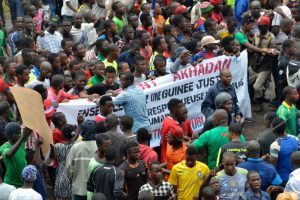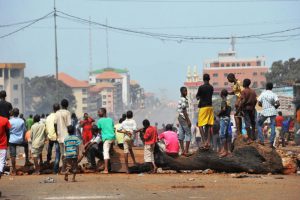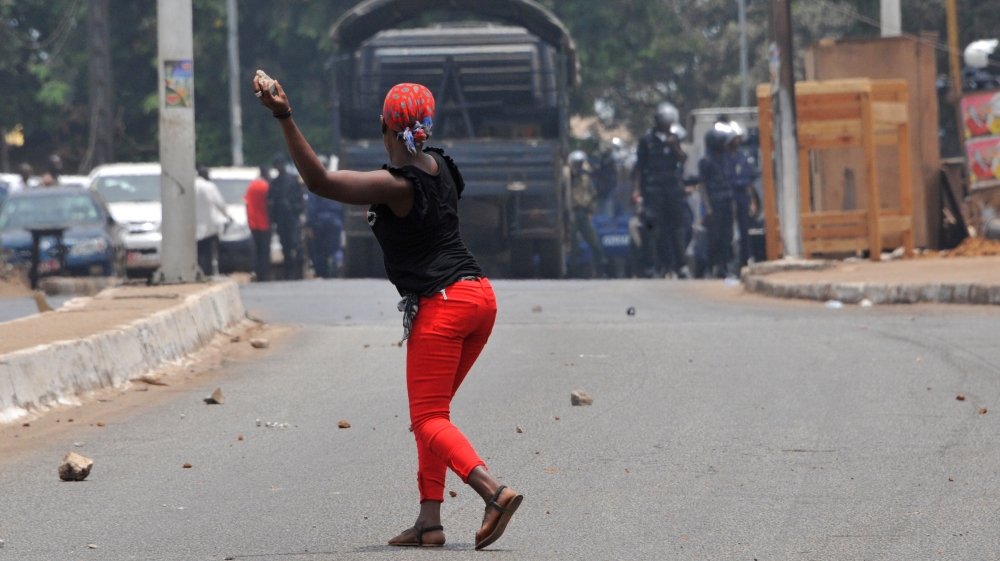
Thierno Hamidou Diallo, may he rest in peace, was fatally shot on 16 August 2016. He was a tragic victim of the anti-government demonstration in the Guinean capital Conakry, which he had nothing to do with. The 21-year old man was hanging out his laundry to dry on a balcony when the bullet hit him.
Until then, it had been the most peaceful anti-government demonstration that one could imagine and probably one of the first to have led each side in the protest to congratulate one another afterwards; opposition leader Cellou Diallo praised “the discipline and professionalism of the security forces“, while government spokesperson Albert Damantang celebrated the event as “another step in our democratic advancement”.
About half a million people had attended the political rally at the central stadium, the atmosphere was hopeful, and when the rally was over, the great majority went back to their homes in peace.
In the neighbourhood of Bambéto, however, police and demonstrators got into a conflict. Some say police blocked the road and did not let the demonstrators pass to walk home. Others argue that it was the demonstrators who attacked the police unit. Whatever happened, a shot was fired, killing Thierno Hamidou Diallo three floors above the road. The key suspect, police captain Kaly Diallo, who headed the Bambéto intervention unit CMIS, was taken into custody. He was carrying a firearm, which police were not allowed to do during the demonstration.
The opposition then changed its tone immediately. Cellou Dallein Diallo announced more demonstrations if the policeman was not judged severely. Opposition spokesperson Aboubacar Sylla argued that “we do not believe in isolated acts”, suggesting this was an evident “provocation by the security forces”. In a matter of hours, Guinean politics was back to crisis mode.
Rising frustrations

To understand this turn of discourse, and the Guinean opposition’s quick recourse to confrontational tactics, one has to understand their frustration with formal politics. The 2013 legislative elections, for instance, which the opposition lost just like the preceding 2010 presidential vote, were arguably too flawed to be legitimate; in certain districts, about half of the ballot papers simply disappeared. And yet, the results were largely accepted by international observers such as the European Union, who favoured Guinea’s political stability, and who “persuaded” the opposition not to contest the outcome. The opposition accepted, possibly hoping to win the 2015 presidential elections, but they lost those too.
At the same time, the more that the presidency of Alpha Condé, in power since 2010, evolves, the more his political strategy is looking illusory. While Condé has arguably worked diligently to re-establish Guinea on the international level, attract investment, employment, and economic growth, his deals with Abu Dhabi-based investment firms and the debt relief granted by the International Monetary Fund have not trickled down to the general population, which faces increasing poverty and inequality, particularly in urban areas.
Though the new Kaléta dam, built by the Chinese, now provides steady electricity to the capital city, Conakry’s cafés and street corners burst with talk about an international conspiracy behind Guinean politics. Fuelled by international investigations about the mining company Beny Steinmetz Group Resources — which in 2008 bribed its way to iron ore exploration rights in Guinea, later selling them for $2.5 billion (or double Guinea’s annual budget that year) — the impression hardens that democracy as preached by donor institutions is less a reflection of donors’ interest in political justice and the well-being of Guineans than a poorly-veiled instrument to open up the country to foreign interests.
Doing politics in such a context is complex, which is why the peaceful demonstration and the positive exchange between the opposition and the government should have got at least some of the spotlight that is now exclusively directed towards the tragic, accidental death of Thierno Hamidou Diallo, a bystander, as if things always have to go wrong.
The government’s Minister of Security and Civil Protection Abdoul Kabelè Camara has tried to reassure the public that all of the unfortunate incidents around the protests will be brought to light and that whoever is found responsible within the police will be judged rigorously.
In terms of the protests, the prospects of what is going to happen next are hard to pinpoint. The opposition spokesperson Aboubacar Sylla said the march on Tuesday was the beginning of a series of demonstrations, and that the next one would take place along Conakry’s inner-city Fidel Castro highway. This is a crucial detail. Until now, opposition marches have routinely taken place on the parallel Route Le Prince, Conakry’s opposition stronghold, while the neighbourhoods along the Fidel Castro highway tend to be associated with the ruling party.
Whether the opposition will be able to draw on popular frustrations outside of their usual political habitat (and these frustrations certainly do exist) and build a broader movement beyond regional and ethnic connotations, or whether such demonstrations will lead (again) to more violent tensions, is the crucial question.
Joschka Philipps holds a PhD from the University of Basel. He has researched urban violence and social protest in Guinea and Uganda, topics discussed in his thesis ‘Crystallizing Contention’ that he defended last week. Based in Conakry, he is currently doing post-doctoral research.
A version of this article was originally published on the Mats Utas blog.



